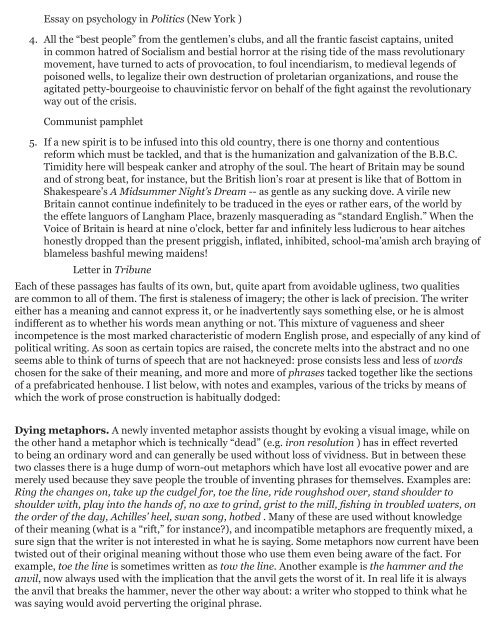Illegitimi non carborundum
Illegitimi non carborundum
Illegitimi non carborundum
Create successful ePaper yourself
Turn your PDF publications into a flip-book with our unique Google optimized e-Paper software.
Essay on psychology in Politics (New York )<br />
4.<br />
All the “best people” from the gentlemen’s clubs, and all the frantic fascist captains, united<br />
in common hatred of Socialism and bestial horror at the rising tide of the mass revolutionary<br />
movement, have turned to acts of provocation, to foul incendiarism, to medieval legends of<br />
poisoned wells, to legalize their own destruction of proletarian organizations, and rouse the<br />
agitated petty-bourgeoise to chauvinistic fervor on behalf of the fight against the revolutionary<br />
way out of the crisis.<br />
Communist pamphlet<br />
5. If a new spirit is to be infused into this old country, there is one thorny and contentious<br />
reform which must be tackled, and that is the humanization and galvanization of the B.B.C.<br />
Timidity here will bespeak canker and atrophy of the soul. The heart of Britain may be sound<br />
and of strong beat, for instance, but the British lion’s roar at present is like that of Bottom in<br />
Shakespeare’s A Midsummer Night’s Dream -- as gentle as any sucking dove. A virile new<br />
Britain cannot continue indefinitely to be traduced in the eyes or rather ears, of the world by<br />
the effete languors of Langham Place, brazenly masquerading as “standard English.” When the<br />
Voice of Britain is heard at nine o’clock, better far and infinitely less ludicrous to hear aitches<br />
honestly dropped than the present priggish, inflated, inhibited, school-ma’amish arch braying of<br />
blameless bashful mewing maidens!<br />
Letter in Tribune<br />
Each of these passages has faults of its own, but, quite apart from avoidable ugliness, two qualities<br />
are common to all of them. The first is staleness of imagery; the other is lack of precision. The writer<br />
either has a meaning and cannot express it, or he inadvertently says something else, or he is almost<br />
indifferent as to whether his words mean anything or not. This mixture of vagueness and sheer<br />
incompetence is the most marked characteristic of modern English prose, and especially of any kind of<br />
political writing. As soon as certain topics are raised, the concrete melts into the abstract and no one<br />
seems able to think of turns of speech that are not hackneyed: prose consists less and less of words<br />
chosen for the sake of their meaning, and more and more of phrases tacked together like the sections<br />
of a prefabricated henhouse. I list below, with notes and examples, various of the tricks by means of<br />
which the work of prose construction is habitually dodged:<br />
Dying metaphors. A newly invented metaphor assists thought by evoking a visual image, while on<br />
the other hand a metaphor which is technically “dead” (e.g. iron resolution ) has in effect reverted<br />
to being an ordinary word and can generally be used without loss of vividness. But in between these<br />
two classes there is a huge dump of worn-out metaphors which have lost all evocative power and are<br />
merely used because they save people the trouble of inventing phrases for themselves. Examples are:<br />
Ring the changes on, take up the cudgel for, toe the line, ride roughshod over, stand shoulder to<br />
shoulder with, play into the hands of, no axe to grind, grist to the mill, fishing in troubled waters, on<br />
the order of the day, Achilles’ heel, swan song, hotbed . Many of these are used without knowledge<br />
of their meaning (what is a “rift,” for instance?), and incompatible metaphors are frequently mixed, a<br />
sure sign that the writer is not interested in what he is saying. Some metaphors now current have been<br />
twisted out of their original meaning without those who use them even being aware of the fact. For<br />
example, toe the line is sometimes written as tow the line. Another example is the hammer and the<br />
anvil, now always used with the implication that the anvil gets the worst of it. In real life it is always<br />
the anvil that breaks the hammer, never the other way about: a writer who stopped to think what he<br />
was saying would avoid perverting the original phrase.














![The Philosophy of Progress [pdf]](https://img.yumpu.com/14077359/1/190x245/the-philosophy-of-progress-pdf.jpg?quality=85)

